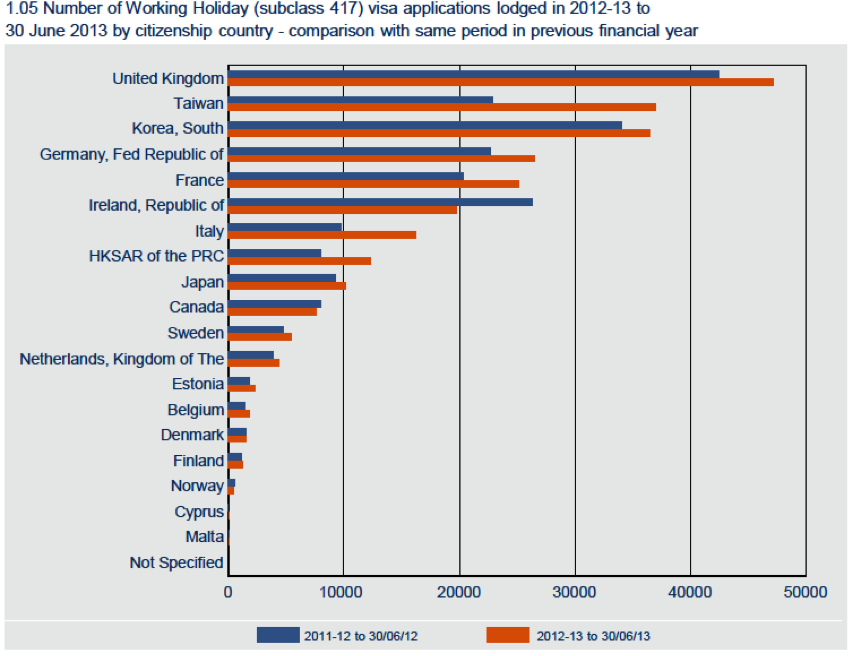
Australian Streets Of Gold
Every year, thousands of young people arrive in Australia on temporary working visas. Drawn by an apparently attractive economy, employment opportunities, high salaries and not to mention golden beaches, there were some 155,325 Working Holiday visa holders and 5,178 Work and Holiday visa holders in Australia as of June 30 2013, according to the Australian Department of Immigration and Border Protection.
38,782 of these are British citizens, the largest number of any nationality in these two visa classes.
It would be useful to note that a number of these are travelling in Australia, and have sought working rights solely to fund their journey. However, there are many visitors that arrive with the intention of permanently leaving behind the comparatively difficult economic situations in Europe and beyond, who go on to seek further visas or sponsorship in order to remain in Australia.

(source: Working Holiday Maker visa program report, 30 June 2013; Australian Department of Immigration and Border Protection)
One of the most notable increases in Working Holiday visa applications in 2013 (compared to 2012) is a 64 per cent leap in those from Italy. Historically a large contributor to Australian immigration, young Italians, perhaps disillusioned by continued volatility in government and the scarcity of permanent, full time jobs on offer, are once again looking beyond their own shores in the search for more economically steady futures.
But what of the effect on young Australians looking for work in the same entry level positions as the flood of hopefuls from overseas? With minimal caps on the number of these temporary working visas issued to mainly under-30s every year, some critics are nervous that Australian high school leavers are suffering at the expense of these foreign arrivals, who pay for a working visa.
The Australian Bureau of Statistics’ Labour Force Survey reported that Australia’s unemployment rate increased to 5.7 per cent in October 2013, compared to 5.4 per cent a year previously. However, if we look back ten years to October 2003, the rate was once again 5.7 per cent.
These are certainly low numbers compared to the 11 per cent unemployment average across the 28 EU member states, including 26.6 per cent in Spain (to September 2013, source: Eurostat).
This post was contributed by a representative of Montgomery Investment Management Pty Limited (AFSL No. 354564). The principal purpose of this post is to provide factual information and not provide financial product advice. Additionally, the information provided is not intended to provide any recommendation or opinion about any financial product. Any commentary and statements of opinion however may contain general advice only that is prepared without taking into account your personal objectives, financial circumstances or needs. Because of this, before acting on any of the information provided, you should always consider its appropriateness in light of your personal objectives, financial circumstances and needs and should consider seeking independent advice from a financial advisor if necessary before making any decisions. This post specifically excludes personal advice.
INVEST WITH MONTGOMERY
Working in Australia for finance professionals is a career killer. It is a rather domestic market. Perhaps for blue collar work definitely a great place. For professional development not sure.
I’ll just add that in cities, you may notice lots of foreign accents in cafes and food outlets. Much of the work is for “cash in hand” without needing to pay minimum wage demanded by Australians. Sure this helps retail outlets offset the astronomical rents which are driving them under but that also means Australian students (who increasingly) need to work to cover expensive education find it harder to find part-time employment.
Paradoxically, it suits the Australian government to employ foreigners as they can’t claim the tax free threshold, nor can they claim medicare or social security benefits. So fiscally, it is in the national interest to employ foreigners as government is keen to reduce the budget deficit. One could argue what’s good for Australian budget is good for all Australians. However I can see a conflict of interest there. That’s what happens when you have an uneven regulation with a degree of protectionism.
About the critic’s view that working holiday visa’s are making high school leavers suffer. From my own experience, my partner from South Korea (the third most representative group on the graph), and her friends dream of getting the jobs that some of the high school graduates can get.
A simple job such as working in a supermarket, or fast food business is out of reach. Very few of her working holiday visa friends can get these jobs because employers want people with perfect English which only works well for a few countries on the list. Also, employers often openly state “no working holiday visas” or small businesses require you to have at least 6 months left which puts many working holiday visas out of work.
For the majority of her time she and her friends end up working picking or packing for labour contractors, who are often the subject of investigation anyway, because it is better than working $10-$12 an hour rate they can get in the city from the community. The past few farms have been set up quite well, with a requirement that you also live near/on the farms dormitories for $200 a week in a room shared with 2 other people. When I was out nearby talking to some of the locals, they remarked that the nearby graduates can’t be bothered doing this kind of manual work. These must be some of the unemployed kids referred to in the percentage.
Putting the relatively poor conditions aside there are some great benefits from coming to Australia on a working holiday visa. It is difficult to think of many other attractive, developed, English speaking countries where foreigners have moderate access to employment which do not require great English skills, just near major cities. As the insight article said, the pay is attractive even when it is low. 6,000 Korean won per hour, or $6 AUD is a regular low wage in Korea and it is favourable compared to $10-12, or even $15 an hour (if you’re fast with your hands picking or packing!) working an unqualified labour job in Australia.
Indeed Ben.
These sorts of figures always confuse me. There is anecdotal evidence from employers that many of the jobs taken by holiday-visa holding travellers are not of interests to local workers. It is said local workers think many of the jobs “are beneath them”. It is said they wish to come in for their first job earning a six-figure salary.
Anyway, the contradiction is that the research from Roy Morgan indicates the highest levels of underemployment on record. When you add up those who are not really employed (you know the silly measure of one hour per week = being employed) and those who want more work, the total is close to twenty percent!
Confused? I guess that many in the group identified by Morgan fall into our ever-increasing casual workforce which i think is pushing 40%. That coupled with crazy and unsustainable real estate prices are sleepers as far as I am concerned. Do away with negative gearing, let people buy houses instead of renting, the government will save billions in tax refunds to landlords and then they can sustain their world on lower wages if that is what we want here. We have interesting times to come, me thinks.
Good points Sean
I can’t really imagine that work and travel visa holders are taking many jobs from young Australians. Many backpackers take temporary or seasonal work such as fruit picking, which Australians probably wouldn’t apply for. Also, what about the economic benefit of having 150,000 tourists in Australia, who stay for a long period (usually 12 months) and usually travel very extensively throughout the country? Many wouldn’t come at all if there wasn’t the work and travel visa option.
Excellent thoughts Paul.
Timely article Roger
Give me your tired, your poor
Give me those that socialism and welfare in Europe has let down.
Bring them here to see how it’s done
At same time they may have lots of fun.
Cheers